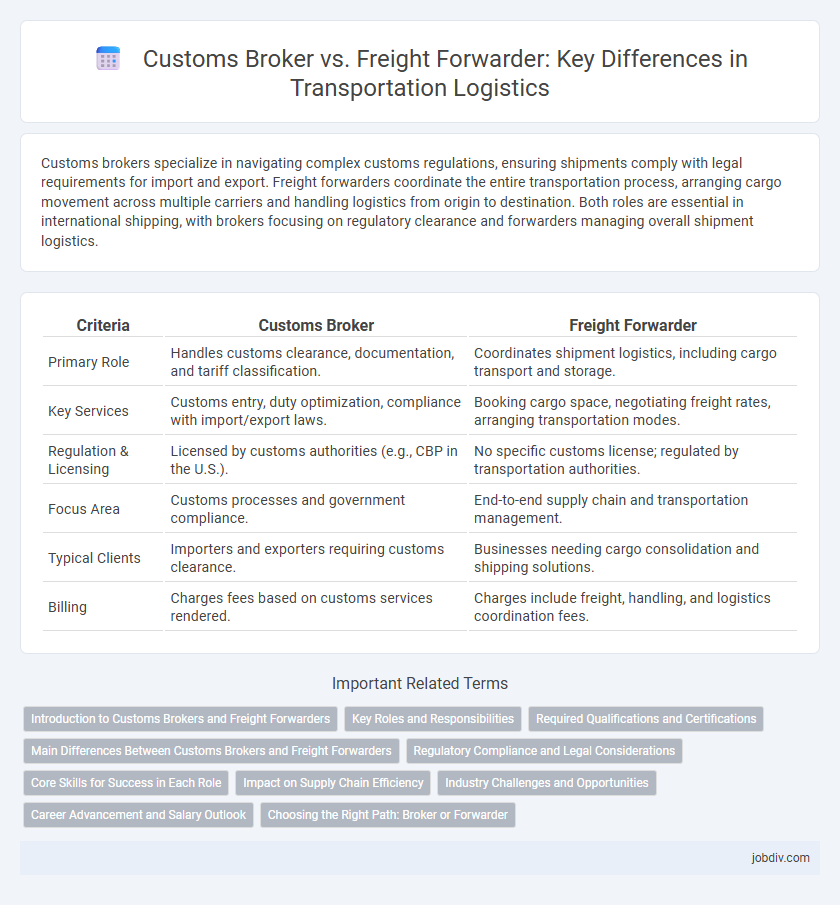Customs brokers specialize in navigating complex customs regulations, ensuring shipments comply with legal requirements for import and export. Freight forwarders coordinate the entire transportation process, arranging cargo movement across multiple carriers and handling logistics from origin to destination. Both roles are essential in international shipping, with brokers focusing on regulatory clearance and forwarders managing overall shipment logistics.
Table of Comparison
| Criteria | Customs Broker | Freight Forwarder |
|---|---|---|
| Primary Role | Handles customs clearance, documentation, and tariff classification. | Coordinates shipment logistics, including cargo transport and storage. |
| Key Services | Customs entry, duty optimization, compliance with import/export laws. | Booking cargo space, negotiating freight rates, arranging transportation modes. |
| Regulation & Licensing | Licensed by customs authorities (e.g., CBP in the U.S.). | No specific customs license; regulated by transportation authorities. |
| Focus Area | Customs processes and government compliance. | End-to-end supply chain and transportation management. |
| Typical Clients | Importers and exporters requiring customs clearance. | Businesses needing cargo consolidation and shipping solutions. |
| Billing | Charges fees based on customs services rendered. | Charges include freight, handling, and logistics coordination fees. |
Introduction to Customs Brokers and Freight Forwarders
Customs brokers specialize in ensuring shipments comply with all import and export regulations, facilitating smooth clearance through customs authorities. Freight forwarders coordinate the logistics of transporting goods, managing carriers, routes, and documentation to optimize delivery efficiency. Both play critical roles in international trade by streamlining supply chain processes and reducing compliance risks.
Key Roles and Responsibilities
Customs brokers specialize in ensuring shipments comply with import and export regulations, handling customs documentation, duties, and tariff classifications to facilitate smooth clearance. Freight forwarders manage the logistic aspects of transportation, including booking cargo space, coordinating shipments, and arranging inland and international transportation modes. Both roles are essential for efficient supply chain management, but customs brokers focus on regulatory compliance while freight forwarders focus on optimizing transport and route planning.
Required Qualifications and Certifications
Customs brokers must obtain a license from the relevant customs authority, such as the U.S. Customs and Border Protection, passing a rigorous exam that covers regulations, tariff classifications, and import laws. Freight forwarders typically require certifications like the Certified Freight Forwarder (CFF) or membership in organizations such as the IATA to demonstrate expertise in logistics and international shipping. Both roles emphasize regulatory knowledge but vary in credentialing focus, with customs brokers concentrating on legal compliance and freight forwarders on operational logistics.
Main Differences Between Customs Brokers and Freight Forwarders
Customs brokers specialize in clearing shipments through customs by ensuring compliance with all import and export regulations, handling paperwork, duties, and tariffs. Freight forwarders focus on organizing and managing the entire transportation process, including selecting carriers, negotiating freight rates, and coordinating shipments across multiple modes of transport. While customs brokers are experts in regulatory requirements and customs clearance, freight forwarders provide end-to-end logistics solutions, often subcontracting customs clearance to brokers.
Regulatory Compliance and Legal Considerations
Customs brokers specialize in ensuring shipments comply with complex international trade regulations, handling paperwork, duty payments, and clearance processes to avoid legal penalties. Freight forwarders coordinate logistics and shipment routes but rely on customs brokers for expert navigation of customs laws and compliance requirements. Understanding the distinct legal responsibilities of each role is essential for businesses to streamline import/export processes and mitigate regulatory risks effectively.
Core Skills for Success in Each Role
Customs brokers excel in compliance management, tariff classification, and navigating complex import-export regulations to ensure seamless clearance of goods. Freight forwarders specialize in logistics coordination, route optimization, and managing multimodal transportation to efficiently deliver shipments worldwide. Mastery of trade documentation and risk mitigation is critical for customs brokers, while freight forwarders thrive on strategic negotiation with carriers and supply chain visibility.
Impact on Supply Chain Efficiency
Customs brokers expedite import and export clearance by ensuring compliance with complex regulations, minimizing delays at borders and preventing costly fines. Freight forwarders coordinate the logistics of cargo movement, optimizing routes and consolidating shipments to reduce transit times and shipping costs. Together, their roles streamline supply chain operations by enhancing speed, reducing risks, and improving overall efficiency in global trade.
Industry Challenges and Opportunities
Customs brokers face complex regulatory compliance challenges due to ever-changing international trade laws and tariff classifications, while freight forwarders must navigate logistical uncertainties like route disruptions and capacity constraints. Both entities have opportunities to leverage advanced technologies such as AI-driven customs clearance systems and real-time shipment tracking to enhance efficiency and reduce costs. Collaboration between customs brokers and freight forwarders can streamline end-to-end supply chain processes, improving transparency and speed in global transportation logistics.
Career Advancement and Salary Outlook
Customs brokers typically command higher salaries, with median earnings around $55,000 to $70,000 annually, reflecting their specialized expertise in regulatory compliance and customs laws. Freight forwarders often see salaries ranging from $45,000 to $60,000, but career advancement can be rapid through roles in logistics management and global supply chain coordination. Both careers offer strong growth potential, though customs brokers benefit from niche regulatory knowledge, while freight forwarders leverage broader operational skills for leadership positions.
Choosing the Right Path: Broker or Forwarder
Selecting the right partner in transportation hinges on understanding the distinct roles of customs brokers and freight forwarders. Customs brokers specialize in navigating complex import/export regulations, ensuring compliance and smooth customs clearance. Freight forwarders manage the end-to-end logistics of cargo movement, coordinating shipments, warehousing, and transportation solutions.
Customs Broker vs Freight Forwarder Infographic

 jobdiv.com
jobdiv.com